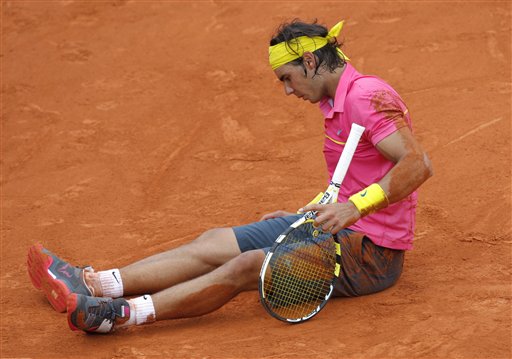By ALAN THATCHER
Rafa Nadal’s collapse in front of the TV cameras, during a US Open press conference, was a very public illustration of the health and fitness issues that concern all athletes.
It all happened in slow motion as he stopped talking, closed his eyes and slowly slid down his chair and on to the floor.
Fortunately, his condition was quickly diagnosed as cramp, brought on by playing in hot and humid conditions at the Flushing Meadows complex in New York.
He returned to the podium to continue his conference and laughed off the attack.
However, another leading professional said: “You guys made a big thing of it because it happened right in front of you all, but this kind of thing happens all the time to nearly every player.
“There’s not a player on the Tour who doesn’t travel around with an array of aches, pains and niggling injuries. That’s the price you pay for trying to stay in peak condition. Cramp is obviously a key factor in the Grand Slams where we are playing five-setters instead of three, often in hot weather. Avoiding dehydration is important.”
Nadal himself took that position a stage further in his autobiography “Rafa” when he wrote: “Playing sports is a good thing for ordinary people; sport played at the professional level is not good for your health. It pushes your body to limits that human beings are not naturally equipped to handle.”
The US Open mirrored last year’s World Open in squash, which was littered with injuries and withdrawals.
While squash players have enjoyed the rare opportunity of a long summer rest following the collapse of a number of events, tennis players have questioned the overwhelming physical strain imposed by an ATP Men’s Tour schedule that now boasts 62 tournaments.
World number four Andy Murray joined the debate when he commented on Twitter: “Is the 18th pull-out in the US Open telling the tennis authorities anything?? No?? Thought not….”
Roger Federer, a man who learnt squash as a youngster before turning to tennis, where he has accumulated 16 Grand Slam titles to his name, says he is amazed and disappointed by the number of tennis players who throw in the towel when faced with physical distress.
He said: “For me it is shocking to see so many retirements. I would say 50% of them are unlucky because they’re not feeling well or getting injured or carrying an injury.
“It comes out in best-of-five-set tennis. You can’t hide it, in my opinion. Could some guys finish the matches? I’m sure, but they didn’t decide to.
“For me, it doesn’t matter how bad I’m feeling, I will be out there and giving it a try, because you never know what’s going to happen. Every player feels different. It’s unfortunate it happens for the fans, I guess.”
Squash players have often made derisory remarks about tennis when comparing the physical demands of the two sports.
In squash, you are locked inside a glass or concrete box until the end of each game, whereas in tennis you can play a mere four points, then rest your legs, take some fluid on board and nibble a banana before returning to action.
Squash offers no such respite. The physical punishment is a legendary badge of honour worn proudly by every player but there are plenty of pros who have succumbed to burn-out down the years.
James Willstrop, a three-time champion at Canary Wharf, made two contrasting exits in the past two tournaments.
This year he suffered his first career defeat to Peter Barker in the semi-finals and his father Malcolm, a leading coach, revealed that he had been physically and mentally exhausted after a punishing schedule on tour.
The previous year, again at the semi-final stage, Willstrop and Nick Matthew played themselves to a standstill in an epic, two-hour contest. The match ended prematurely as Willstrop dived in vain in pursuit of a shot into the back left corner and ended up in a heap on he floor as he suffered an agonising attack of cramp in his quad muscle.
Willstrop received treatment on court before conceding the contest, on match ball down.
For Matthew, his evening was far from finished. He required more than two hours of treatment from physio Sylvan Richardson to enable him to front up the next day to face Gregory Gaultier in the final.
Astonishingly, Matthew looked the stronger and fitter of the two players as he overcame the Frenchman 3-1 to win his first Canary Wharf final.


